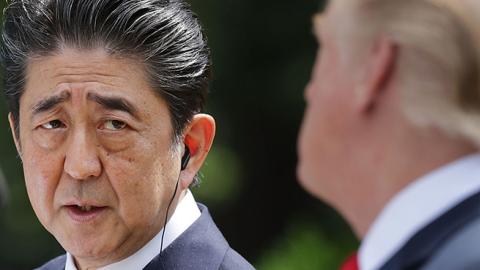President Trump opened a number of very important bilateral free trade negotiations in 2017 and 2018. The South Korean and North American rewrites are finished. China of course dominates the remaining list as by far the most important in terms of economic and political impact. But the beginning of discussions with the European Union and Japan, as well as the repeated suggestions of a deal with the United Kingdom when it is liberated from the European Union, are also important because of their huge volumes of trade and investment with the United States. Solid trade relations with these three economic powerhouses is crucial to achieving some semblance of unity in meeting the Chinese mercantilist challenge.
The most sensible target for American negotiators this year ought to be Japan. It is the only one of the three that the Office of United States Trade Representative has published an official set of negotiating objectives. In a negative sense, European Union bureaucracy, which represents 28 nations and works on a principle of consensus, is dragging its feet and appears reluctant to move forward in a timeframe likely to meet the expectations of President Trump, increasing the possibility that he pulls the trigger on his threatened automobile tariffs. If agriculture is off the table, lawmakers in Congress have signaled opposition to the negotiations. Moreover, it is unclear if the political leaders in Germany and France, both besieged by internal challenges, are willing to strike any deals with President Trump.
The sizable economic promise of a deal between the United States and United Kingdom is frozen because of the imminent Brexit. The tentative agreement with the European Union on the terms of the exit of the United Kingdom would block the chances of any independent agreement with the United States for several years. Alternatively, a hard exit, without accord on the terms of Brexit, would likely lead to internal political chaos and inability to agree on a strategy for a trade pact with the United States.
By contrast, the forces in Japan are more clearly aligned to reach a broad agreement with the United States. Japan is keenly aware of its ambitions and powerful neighbor to the west. It has remained comfortable with United States leadership for many decades in both economic and political matters. It has worked diligently with the United States and the European Union to modify the operations and rules of the World Trade Organization, clearly aiming at addressing the Chinese flaunting of rules and its growing mercantilism. The fourth trilateral meeting of trade ministers of the United States, European Union, and Japan in fact took place today in Washington.
Although President Trump withdrew the United States from the Trans Pacific Partnership, citing its negative impact on the manufacturing sector, other parts of that agreement could be revived to the benefit of the United States in a formalized trade accord with Japan. For example, Japan gave some ground in access to its agricultural markets, including rice and beef. Since the Trans Pacific Partnership was adopted by 11 other nations, American farmers and ranchers are at a large disadvantage to agricultural exporters like Canada and Australia, which remained in the pact, now called the Comprehensive and Progressive Agreement for Trans Pacific Partnership. Tariffs on grains and meat are more than 10 percent lower for its members as compared to those affecting the United States.
The updated pact has solid new rules for the operations of state owned enterprises, intellectual property protection, and digital trade, all of which could be used as templates for a possible agreement with China. The updated pact also affirmed important rules of prohibiting data localization and transfers, both crucial to new industries such as artificial intelligence, the internet of things, and digital commerce. The United States supports these features and could capture the benefits on agriculture and digital trade with Japan through a formal agreement. The traditional problem areas with Japan, such as automobiles, government procurement, and competition from state owned enterprises would take more negotiations.
Japanese Prime Minister Shinzo Abe has an electoral mandate that gives him the flexibility to negotiate with the United States. He has shown a willingness to work with President Trump by not retaliating against the Section 232 steel and aluminum tariffs, and by working in the process to develop principles for World Trade Organization reform. The United States should seize the opportunity this year to complete an agreement with the third largest economy in the world and strengthen the consensus on challenging the threat of China to the open trade system. With fresh openings on agriculture, a set of new rules for the digital economy, and possible Japanese purchases of military equipment and liquified natural gas, an agreement might also help reduce the bilateral trade deficit.













